
|
Astronomy Picture Of the Day (APOD)
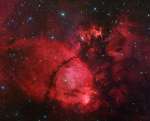 The Color of IC 1795
The Color of IC 1795
13.10.2011
This sharp cosmic portrait features glowing gas and obscuring dust clouds in IC 1795, a star forming region in the northern constellation Cassiopeia. Also cataloged as NGC 896, the nebula's remarkable details, shown...
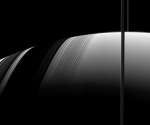 Saturn: Shadows of a Seasonal Sundial
Saturn: Shadows of a Seasonal Sundial
12.10.2011
Saturn's rings form one of the larger sundials known. This sundial, however, determines only the season of Saturn, not the time of day. In 2009, during Saturn's last equinox, Saturn's thin rings threw almost no shadows onto Saturn, since the ring plane pointed directly toward the Sun.
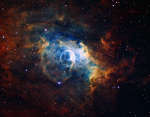 NGC 7635: The Bubble Nebula
NGC 7635: The Bubble Nebula
11.10.2011
It's the bubble versus the cloud. NGC 7635, the Bubble Nebula, is being pushed out by the stellar wind of massive central star BD+602522. Next door, though, lives a giant molecular cloud, visible to the right. At this place in space, an irresistible force meets an immovable object in an interesting way.
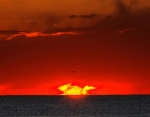 A Strange Sunrise Over Argentina
A Strange Sunrise Over Argentina
10.10.2011
Why would a rising Sun look so strange? No one is yet sure. What is clear is that the above unusual sunrise was captured last month from Buenos Aires, Argentina. The body of water in the foreground is Rio de La Plata, considered by many to be the widest river in the world.
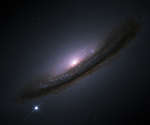 Nobels for a Strange Universe
Nobels for a Strange Universe
9.10.2011
Thirteen years ago results were first presented indicating that most of the energy in our universe is not in stars or galaxies but is tied to space itself. In the language of cosmologists, a large cosmological constant is directly implied by new distant supernova observations.
 MESSENGER s First Day
MESSENGER s First Day
8.10.2011
One solar day on a planet is the length of time from noon to noon. A solar day lasts 24 hours on planet Earth. On Mercury a solar day is about 176 Earth days long.
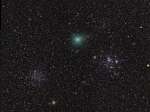 The Comet Hartley 2 Cruise
The Comet Hartley 2 Cruise
7.10.2011
Early last November, small but active Comet Hartley 2 (103/P Hartley) became the fifth comet imaged close-up by a spacecraft from planet Earth. Still cruising through the solar system with a 6 year orbital period, Hartley 2 is is making astronomical headlines again, though.
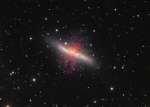 M82: Starburst Galaxy with a Superwind
M82: Starburst Galaxy with a Superwind
6.10.2011
Also known as the Cigar Galaxy for its elongated visual appearance, M82 is a starburst galaxy with a superwind. In fact, through ensuing supernova explosions and powerful winds from massive stars, the burst of star formation in M82 is driving the prodigous outflow of material.
 Comet and CME on the Sun
Comet and CME on the Sun
5.10.2011
Did a sun-diving comet just cause a solar explosion? Probably not. This past weekend a comet dove toward the Sun and was followed very quickly by a Coronal Mass Ejection (CMEs) from the other side of the Sun.
 QR Codes: Not for Human Eyes
QR Codes: Not for Human Eyes
4.10.2011
This communication was not meant for human eyes. It was not even meant for aliens eyes. It's an attempt to communicate directly with your smartphone. Cameras on many smartphones can image the above Quick Response (QR) code and then common applications can tell you what it means.
|
January February March April May June July August September October November December |
|||||||||||||||||||||||||||||||||||||||||||||||||